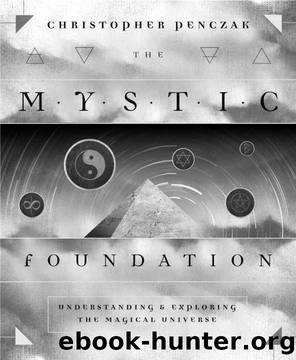The Mystic Foundation: Understanding and Exploring the Magical Universe by Christopher Penczak

Author:Christopher Penczak
Language: eng
Format: epub, mobi
Published: 2008-11-29T17:17:00+00:00
11
M A g I C
Magic is a powerful, evocative word. All cultures and traditions recognize magic, but not all use the same word for it. Magic is the process of creation. All creation stories are really magic stories, regardless of the mythology. They often start with a word, sound, or song. In the New Testament, John 1:1 says: "In the beginning was the Word, and the Word was with God, and the Word was God." The Word is a magic word. Sound and word are vibrations. Vibration is energy. Harnessing and directing energy is magic. Your own words have the same creative power and energy.
Energy comes in many forms. Not only are our words energy, but our thoughts and actions are too. Herbs, metals, stones, symbols, and colors are all forms of energy. Traditional forms of magic involve all sorts of exotic paraphernalia and recipes. Though they have powerful symbolic value as well, each resonates with a particular type of energy. Magic rituals harness this energy, along with the magician's will, to create a change in reality.
Magic is described as a science. Though many people would disagree with that description, magic conforms to basic principles and parameters that are consistent. If you look across many cultures, the paradigms describing magic are different, but each contains some basic similarities that can be boiled down to what metaphysical students call magic theory.
A popular thought stated in science fiction literature is that any science or technology not understood by an observer appears to be magic. When we think of all the technological marvels at hand in the current era, people in the past would probably be awestruck by our technology, and assume it has a magical origin. The same process works in reverse. Technologies from the past, relying on principles not generally understood in the modern era, seem fantastic or unbelievable, but at one time they were a part of the ordinary view of reality.
Nonmagical practitioners often think of magic as a science as well, but do not understand how the practitioner is intrinsically tied to the process. Magic is a science, but it is also an art, a skill to be learned. Modern stories propagate the idea that if you simply say the right magic word, at the right time, and in the right place, or mix together the right combination of exotic ingredients, poof, something amazing will happen. As in modern science, they expect all experiments to be repeatable by anyone. Under the right laboratory conditions, two parts hydrogen to one part oxygen always makes HZO, or water. This chemical reaction is predictable and repeatable. Sugar dissolves in water, a process that's also repeatable. It doesn't matter who does it. The results are always consistent if the conditions and the procedure are the same.
With art, it's an entirely different matter. Imagine a room full of people with a wide variety of skills, tastes, and backgrounds. We can all start with the same box of paints, have all the same resources available, and all be shown a model whose portrait we are to paint.
Download
The Mystic Foundation: Understanding and Exploring the Magical Universe by Christopher Penczak.mobi
This site does not store any files on its server. We only index and link to content provided by other sites. Please contact the content providers to delete copyright contents if any and email us, we'll remove relevant links or contents immediately.
The Lost Art of Listening by Michael P. Nichols(7489)
Why I Am Not A Calvinist by Dr. Peter S. Ruckman(4148)
The Rosicrucians by Christopher McIntosh(3509)
Wicca: a guide for the solitary practitioner by Scott Cunningham(3166)
Signature in the Cell: DNA and the Evidence for Intelligent Design by Stephen C. Meyer(3125)
Real Sex by Lauren F. Winner(3014)
The Holy Spirit by Billy Graham(2944)
To Light a Sacred Flame by Silver RavenWolf(2814)
The End of Faith by Sam Harris(2733)
The Gnostic Gospels by Pagels Elaine(2527)
Waking Up by Sam Harris(2454)
Nine Parts of Desire by Geraldine Brooks(2358)
Jesus by Paul Johnson(2352)
Devil, The by Almond Philip C(2324)
The God delusion by Richard Dawkins(2305)
Heavens on Earth by Michael Shermer(2278)
Kundalini by Gopi Krishna(2180)
Chosen by God by R. C. Sproul(2160)
The Nature of Consciousness by Rupert Spira(2101)
